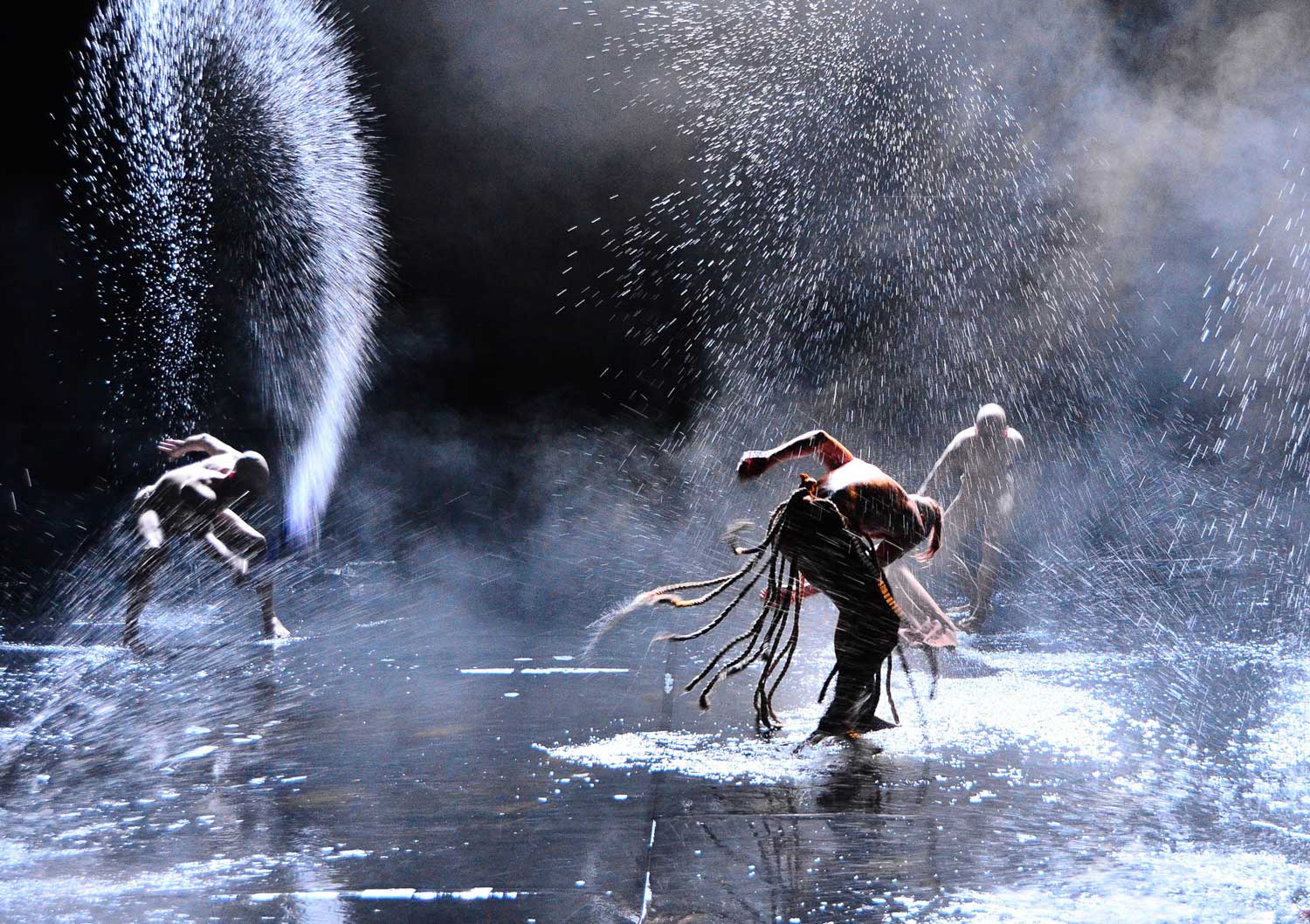Artistic development on the Festspielhaus (Festival Theatre) site
The beginnings of the artistic rediscovery of the Festspielhaus (Festival Theatre) site were adventurous, provisional and exciting. In just a few years, the location developed into one of the most innovative venues for contemporary art and culture in Dresden and Saxony with huge European appeal. Since 2004, the European Centre for the Arts has been operating here as an interdisciplinary co-production and guest performance theatre offering contemporary arts dance, music, theatre, performance, media art, and visual arts spaces for production and presentation. In terms of the programme, it initiates and promotes debates on art and society with thematic focuses, festivals, and audience formats.

Ketzal , DEREVO, 2015.
© Peter R. Fiebig
1992–2006
At the beginning of 1990, the Förderverein für die Europäische Werkstatt für Kunst und Kultur Hellerau e. V. (Association for the Promotion of the European Workshop for Art and Culture Hellerau) was formed and, in the midst of the general social upheaval, set itself the task of finding out what should happen to this unique cultural location.
In the eventful, adventurous nineties, performances and experiments, dance, theatre, music as well as interdisciplinary projects took place on the forecourt and soon also in the Festspielhaus (Festival Theatre). The initiator of the new beginning for the Festspielhaus (Festival Theatre) Detlev Schneider and many artists dared the possible and the impossible with borrowed lighting technology, in the freezing cold Festspielhaus (Festival Theatre), with the droning noise of aeroplanes or even water leaking in from the continuous rain. They lived and worked with makeshift solutions: ‘Renovation as artistic transformation’. It is thanks to this core concept regarding the programme that productions have been staged in Hellerau over the years that drew their exceptional atmosphere and expressiveness from the correspondence between the rooms marked by misuse and decay and history. The first ‘festival’ in 1992 was followed by others, and from 1995 onwards, art events, exhibitions, performances, productions, parties, workshops, and discourse from spring until late autumn.
In 1996, the ‘Theatre of the World’ festival set the tone. Partnerships were formed with the Dresden Centre for Contemporary Music and Tanzbühne Dresden e. V.: productions from the International Dance Week and the Dresden Contemporary Music Days were regularly shown. From 2000 onwards, the media art festival CYNETART and the International Rhythmics Workshop were added and in 2003 (until 2018), the DEREVO dance theatre took up residence on site.
In summer 2002, the Dresden Centre for Contemporary Music moved to the Festspielhaus (Festival Theatre) site with the aim of continuing the open workshop character in Hellerau. It became the European Centre for the Arts Hellerau in 2004 as a stage by the state capital Dresden to bundle and promote artistic development and programming. The composer Udo Zimmermann was appointed as the founding artistic director and led the theatre until 2008. The merger of the Dresden Centre for Contemporary Music with the newly founded European Centre for the Arts Hellerau has added new areas to the Festspielhaus’ (Festival Theatre) work. The processing of the international music library taken over from Berlin and the establishment of a German composers’ archive in cooperation with the GEMA Foundation were added.
2006–2023
On 7 September 2006, the Festspielhaus Hellerau (Hellerau Festival Theatre) was reopened after renovation with an official ceremony and several performances of the Forsythe Company’s ‘Human Writes’ choreography. The establishment of The Forsythe Company under the direction of the internationally renowned choreographer William Forsythe in Hellerau as a cooperation project of the cities and states of Dresden, Frankfurt am Main, Hesse, and Saxony marked another milestone for the European Centre for the Arts.
From 2009 to 2018 Dieter Jaenicke directed the theatre and established a year-round, continuous performance programme with a focus on international contemporary dance for the first time. The theatre continued its work in the field of contemporary music, especially within the framework of the biennial ‘Tonlagen – Dresden Festival of Contemporary Music’. In addition, programme formats such as Kids on Stage, Bandstand, Linie 8, and Golgi Park – Intercultural Garden were developed. In 2015, the photography competition PORTRAITS – HELLERAU Photography Award was established.
In 2018, Carena Schlewitt took over as artistic director. Today, HELLERAU – European Centre for the Arts is one of the most important international centres for contemporary arts in Germany and Europe. It acts as an interdisciplinary co-production and guest performance theatre offering contemporary arts dance, music, theatre, performance, media art, and visual arts spaces for production and presentation. HELLERAU supports the development of regional independent actors and ensembles and offers residencies and working residencies for artists from all over the world. In addition to the event, rehearsal, and residence spaces, the spacious culture garden is also used for artistic events. HELLERAU is a member of The Alliance of International Production Houses and cooperates with numerous partners and networks.
Since 2015, HELLERAU has been one of the two residency venues for the Dresden Frankfurt Dance Company, which emerged from the former Forsythe Company. After the artistic direction of Jacopo Godani (2015-2023), Ioannis Mandafounis will take over as company director in the summer of 2023.
In terms of the programme, HELLERAU initiates and promotes debates on art and society with various thematic focuses and festival formats. A major interest is the role of the arts in the social transformation processes of the former Eastern Bloc countries after 1989. Other themes revolve around neighbourhoods, generations, identity(ies), and environmental sustainability. In 2019, HELLERAU hosted the fifth edition of the renowned dance congress by the German Federal Cultural Foundation under the direction of choreographer Meg Stuart. Founded in 1987 by composer, conductor, and artistic director Udo Zimmermann, the ‘Dresden Days of Contemporary Music’ have been held again under their original founding name since 2023.
HELLERAU – European Centre for the Arts lives through encounters with artistic positions and processes in the performing arts dance, music, performance, and media art and sees itself as a cosmopolitan place for encounters for a broad audience.
